|
|
|
Sort Order |
|
|
|
Items / Page
|
|
|
|
|
|
|
| Srl | Item |
| 1 |
ID:
141963
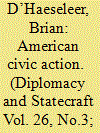

|
|
|
|
|
| Summary/Abstract |
From 1979 until 1992, the United States government intervened in the Salvadoran Civil War to defeat ‘communist revolution,’ establish a moderate, centrist government, and prevent its overthrow. One of the primary means to accomplish American goals in El Salvador rested on a thorough application of counter-insurgency. In particular, American and Salvadoran strategists used civic action programmes to win the ‘hearts and minds’ of Salvadorans and gain their allegiance. In 1983, whilst the war was at its zenith, the Salvadoran military launched an important counter-insurgency effort that attempted to reverse the government’s fortunes. Unfortunately, these plans failed to affect decisively the outcome of the conflict. Regardless, given their failure in the largest American intervention in the post-Vietnam era, they continue to remain a fundamental aspect of American counter-insurgency doctrine.
|
|
|
|
|
|
|
|
|
|
|
|
|
|
|
|
| 2 |
ID:
141965
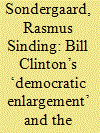

|
|
|
|
|
| Summary/Abstract |
Faced with creating a grand strategy for American foreign policy in the post–Cold War world, the Clinton Administration launched the strategy of ‘Democratic Enlargement.’ This analysis makes two contributions to the existing literature on the topic. First, it investigates the role of Wilsonianism and the ‘Democratic Peace Thesis’ in the discourse of the strategy of ‘Democratic Enlargement’ based on public speeches with a focus on the relationship between democracy and security. Second, it utilises securitisation theory to analyse how Clinton’s Administration used the linkage of democracy and security to legitimise humanitarian interventions in Haiti and Kosovo. By addressing ‘Democratic Enlargement’ in security terms, the Administration securitised democracy promotion and, thereby, created a discourse that helped legitimise a gradual move towards a more militaristic foreign policy during Clinton’s presidency. This discourse offered arguments later utilised by the George W. Bush Administration.
|
|
|
|
|
|
|
|
|
|
|
|
|
|
|
|
| 3 |
ID:
141959
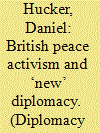

|
|
|
|
|
| Summary/Abstract |
This analysis provides a re-appraisal of the 1899 Hague Conference by looking more closely at how citizen activists—notably in Britain but also transnationally—used it as a forum through which to press their agenda onto politicians and diplomatists. In so doing, this assembly existed as a stepping-stone between the ‘old’ diplomacy of the nineteenth century and the ‘new’ diplomacy of the twentieth. Peace activists identified and harnessed a growing body of progressive public opinion—on both a domestic and international scale—in the hope of compelling governments to take the necessary steps towards realising their ambitions of peace, disarmament, and international arbitration. Although the tangible outcomes of the 1899 Conference were limited, the precedents it established not only paved the way for further advances in international law, but also facilitated ever closer public and press scrutiny of international affairs into the twentieth century.
|
|
|
|
|
|
|
|
|
|
|
|
|
|
|
|
| 4 |
ID:
141960
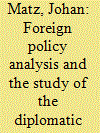

|
|
|
|
|
| Summary/Abstract |
In 1982, claims were made that the Swedish diplomat, Raoul Wallenberg, when preparing in mid-January 1945 for his trip to Soviet military headquarter in Debrecen, north of Budapest, concealed large amounts of valuables—gold and jewellery—in his car. Moreover, the argument exists that Russian discovery of these valuables had a significant impact on both Swedish and Soviet handling of his case. Recently re-surfacing in a biography of Wallenberg, this claim is incorrect. The testimonies referred to in its support are fraught with serious weaknesses and, the causal chain allegedly set off about finding the valuables is not verifiable. This analysis argues that the study of the diplomatic history of the Wallenberg case could benefit significantly by taking some basic insights from the field of foreign policy analysis into account.
|
|
|
|
|
|
|
|
|
|
|
|
|
|
|
|
| 5 |
ID:
141964
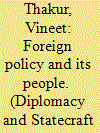

|
|
|
|
|
| Summary/Abstract |
Just as apartheid was ending, South Africa’s foreign relations witnessed a massive expansion. However, the Department of Foreign Affairs that was to manage this change found itself undergoing institutional transformations of both personnel and ideology. Studies on South African foreign policy have mostly neglected this transformation, which has had a considerable influence on the content and direction of South African foreign policy. In discussing this seldom-studied issue, this analysis unearths the discussions and debates that took place between various stakeholders to bring about transformation in the Department. In doing so, it argues that two different cultures of diplomacy came together in forming the new Department of Foreign Affairs. These cultures have had a significant impact on the thrust and direction of post-apartheid South Africa foreign policy.
|
|
|
|
|
|
|
|
|
|
|
|
|
|
|
|
| 6 |
ID:
141961
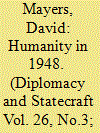

|
|
|
|
|
| Summary/Abstract |
By approving prohibitions on genocide and embracing the Universal Declaration of Human Rights (UDHR), the United Nations in 1948 sustained a theory premised on the centrality of people—both in their collective and individual capacities—that enjoyed primacy over the claims of the sovereign state. This affirmation of human rights dovetailed with the UN’s earlier endorsement of the Nuremberg principles with their emphasis on personal accountability. The melding of privileges and responsibilities gestured toward, although it did not fully encompass, that philosophical line strenuously espoused at the time by the eminent legal theorist, Hersch Lauterpacht: the state is not a sanctified end but merely the custodian of the welfare and ultimate purpose of human beings. This analysis examines the Genocide Convention and the UDHR and brings into conversation their drafting histories, politics, and diplomacy. It traces the saga of two seminal documents and their tandem fates in Cold War America. The collectivist project of the Genocide Convention and the individualistic emphasis of the UDHR are usefully placed in the same analytical frame, something seldom done in the literature that deals with human rights and norms-making of the late 1940s and their interaction with Cold War dilemmas. As peoples and governments pick their way through the hazards of the twenty-first century, it is exigent—for the sake of upright bearing—to stay mindful of the orientation prescribed in the Genocide Convention and the UDHR.
|
|
|
|
|
|
|
|
|
|
|
|
|
|
|
|
| 7 |
ID:
141962
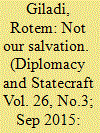

|
|
|
|
|
| Summary/Abstract |
Jewish individuals and organisations played a cardinal role in making and promoting the 1948 Genocide Convention. The early attitude of the Jewish state—established a few months before the Convention’s conclusion—has not hitherto been explored. This analysis reconstructs Israel’s involvement in the 1951 advisory proceedings at the International Court of Justice concerning the Convention. Based on Ministry of Foreign Affairs archives and Court records, it demonstrates that contrary to what scholarship on subsequent episodes assumes or implies, Israel had no particular attachment to, nor was it vested in, the Convention. Rather, its attitude ranged from indifference and disinterest to scepticism and hostility. It allowed Israeli diplomats to utilise the Convention as a means to affect other neither urgent nor imperative foreign policy ends.
|
|
|
|
|
|
|
|
|
|
|
|
|
|
|
|
|
|
|
|
|